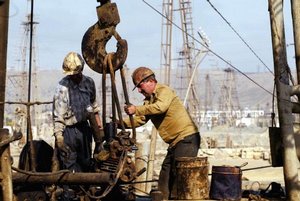OPEC's declining role to improve the situation on the global oil market
The expert conclusion about the price of $100 for a barrel of oil is most likely an intimidating hoax
The Organization of the Petroleum Exporting Countries, OPEC, acknowledged two days ago that it was incapable of restraining the growing oil prices, which had already overcome the limit of $55 per barrel. OPEC members said that the crude extraction was being conducted on an acceptable level, whereas the further increase of the extraction was rather problematic. Saudi Minister for Oil, Ali Al-Naimi said that Saudi Arabia's crude extraction level was compatible with the nation's sales capacity. According to the Saudi minister, the prices on energy-carriers continue growing because of oil processing companies. 
However, OPEC continues running the activity, or creating the semblance of it, to put the affairs on the oil market to order. Saudi officials suggested increasing the upper limit of crude extraction for OPEC members by 500,000 barrels a day. It is doubtful, however, that such actions will affect the market. Algerian Minister for Oil Industry, Chakib Khelil, said that the suggestion would most likely be upheld, although it would not produce any effect at all.
The recent experience proves that the Algerian minister is absolutely right. It is obvious nowadays that OPEC's efforts cannot show the real influence on the oil market. Periodical statements from the cartel about the need to increase the output make no sense, when OPEC members (save for Saudi Arabia only) extract crude on the maximum level. It is an open secret that it is very easy to sell the extracted crude at rather high prices.
OPEC's existence becomes more and more pointless with every year. OPEC's statements regarding changing quotas used to have a short-term influence on the market a year or two ago. Such verbal interventions have become meaningless nowadays. OPEC's role and significance has been reducing in the world. It brings up the idea that the cartel may soon end its existence.
As for the life of the “post-OPEC” oil market, experts say that the elimination of the organization will trigger the disintegration of the global market of oil. Such a global change will inevitably result in a sudden increase of oil prices. A barrel of oil may cost $100, according to most pessimistic forecasts.
On the other hand, one may assume that such pessimism is groundless. It is clear now that the oil cartel cannot execute its regulating functions. Therefore, if OPEC disappears, the situation will not change for the worse much. Furthermore, the cartel currently acts as a destructive factor for the global market of oil. In this case, if the cartel is removed, the situation may even improve: it would probably be easier to achieve acceptable sales and extraction conditions with the help of individual agreements with certain oil-making states.
As experience shows, independent oil makers, such as Norway and Russia, enjoy better conditions on the oil market. They are not bound with any obligations, which often contradict to both objective affairs in the oil system of a certain country and the export policy, which this country runs. Current OPEC members may also wish to build individual ties with certain consumers. We may thus infer that the forthcoming revolution on the oil market may not have such lamentable consequences as some analysts envisage.
The expert conclusion about the price of $100 for a barrel of oil is most likely an intimidating hoax. Oil prices started growing several years ago because of low interest rates that were set on US and other financial markets. It subsequently resulted in the shortage of lucrative and high-liquid financial instruments. The gap was eventually filled with the help of commodity futures. The oil market is the most global one among all kinds of commodity markets, that is why it played the role of a speculative pyramid at this point.
Increasing rates on financial markets will sooner or later result in the outflow of capital from other fields of the market, including the market of oil futures. As a result, the speculative activity on the oil market will reduce, whereas market quotations will drop too. It is not going to be an instant process, of course. However, the market will return to classic price-formation process under the influence of demand and supply.
Subscribe to Pravda.Ru Telegram channel, Facebook, RSS!





